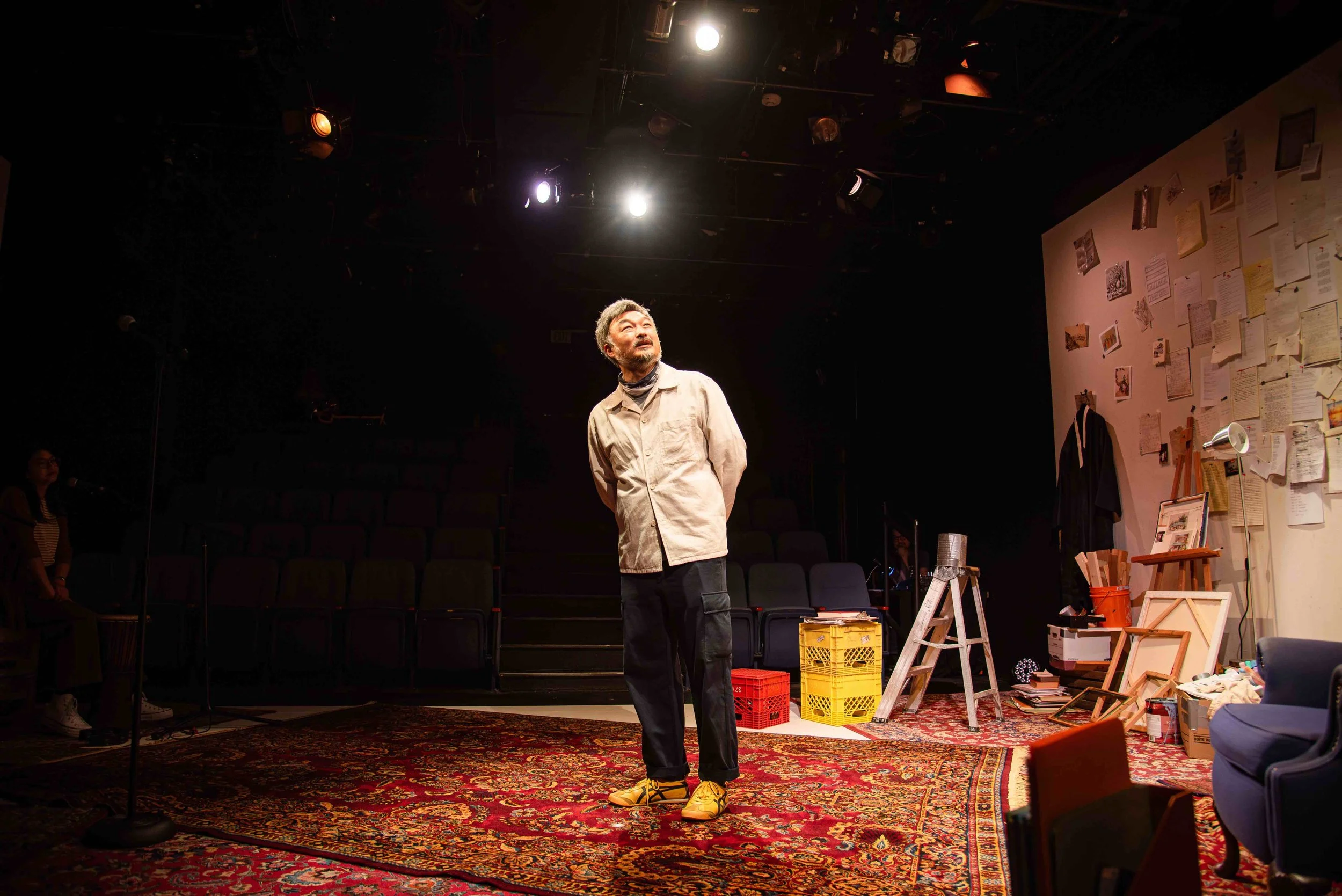Theatre review: Burning Mom steps into the unknown with warmth and humour
With its openhearted journey through grief, Susinn McFarlen’s charming solo performance fills the Arts Club’s Granville Island Stage
Susinn McFarlen in Burning Mom. Photo by Moonrider Productions
The Arts Club Theatre Company presents Burning Mom at the Granville Island Stage to April 24
DOROTHY, THE 63-YEAR-OLD, happy-go-lucky heroine of Burning Mom, would make an ideal road trip companion, and that’s not just because she owns a shiny, state-of-the-art RV. She’s resilient, organized, open-minded, and thirsty for adventure. Her ability to convince others—and more importantly, herself—of that is at the core of this one-woman play that gently reminds us it’s never too late to learn something new about ourselves.
Written and directed by Mieko Ouchi and inspired by her real-life mother, Burning Mom follows this particular Dorothy on her very own journey to Oz; from her hometown of Calgary to the Burning Man festival in Nevada. What sets her in motion is grief. After the sudden death of her husband, Eugene, she decides to honour the travel plans they made for retirement. There’s just one small hiccup: she still has to learn how to drive the camper.
At the Granville Island Stage, the show delivers warm, human comedy. Some of it comes from Susinn McFarlen’s relaxed, charming performance. Some of it comes from visual scale. Patrick Rizzotti’s set design places Dorothy in front of a towering RV that dominates the stage. She hauls around a few simple items: a tiny foldable table, a single camping chair, a small rectangle of Astroturf. They underline her solitude on this journey, which she’s learning to embrace, even if it looks strange to others.
A running gag about Dorothy’s dread of parking the massive RV is consistently funny, thanks to McFarlen’s delivery and timing. Everyone she meets questions her ability to manage the rig, and to be fair, it is no small feat. These mundane hurdles keep the story grounded and remind us that her road to self-reliance is shaped by both inner doubt and outside voices. Her slight neuroticism, as when stockpiling instant noodles or rhyming directions to remember her way back to camp, and her occasional clumsiness, are played for laughs without mocking her. The play embraces her tenacity and curiosity, traits that make her a natural fit for Burning Man.
Before heading into Black Rock City, she jots down some guiding principles: think like a four-year-old, sip water constantly, talk to strangers. It’s a sweet little moment that shows her openness to stepping into the unknown. By now, we’ve already seen her get through a bunch of small hurdles, become more self-reliant, and talk openly about her grief. So while it’s satisfying to watch her set off to the festival, a few scenes—like her conversations with fellow Burners or the mention of the dark diaries she kept right after Eugene died—feel like missed chances to go a bit deeper. It kind of feels like we’re meeting her further along in her healing, already more grounded, or maybe just naturally wired to let go. Either way, some of those reflective moments don’t quite land the way they could.
Still, there are touching moments throughout, and it would be a disservice not to mention McFarlen’s ability to move easily between casual storytelling and more introspective beats, making her character feel fully rounded. The show’s design also becomes fittingly more dynamic and expressive during the second half. Lighting, projections, and even the set all shift to reflect the strange, colourful, and dust-covered world of the desert, just as Dorothy's world opens up.
Early on, the retired mom picks up a copy of Cheryl Strayed’s bestselling travel memoir Wild on the recommendation of a Chapters employee. The reference feels deliberate and a little tongue-in-cheek—especially as she decides to ditch the book at some point. Like Wild, Burning Mom is about rediscovery and renewal—but where Wild leans into grit and solitude, this play chooses humour, ease, and warmth. Dorothy’s path is more pleasant and more buoyant, and she moves through the challenges with a kind of openness that makes her instantly adaptable. Everyone she meets ends up helping her, and the audience is just as easily charmed.
The reference to Wild also lightly nods to a familiar kind of story: someone setting off into the wilderness, hoping to find clarity or transformation. Burning Mom fits into that tradition, but it’s not chasing hard-earned breakthroughs or heavy revelations. Instead, it finds meaning in smaller, more everyday moments that remind its central character who she is and who she’s still becoming. That unassuming approach is what gives the play its heart. Like Dorothy, it’s honest, open, and ultimately comfortable in its own skin. ![]()

























